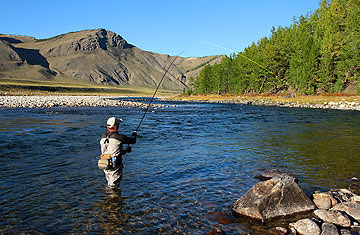
Casting: The guide demonstrates a double-handed backcast
Best Place to go Fly-fishing
Mongolia
Norman Maclean, whose 1976 novella, A River Runs Through It, elevated fly-fishing from hobby for tweedy eccentrics into a metaphysical quest for a state of grace, would have appreciated the Delger-Muron River. Winding through larch forests and beneath granite massifs in the mountainous taiga of north-central Mongolia, the Delger-Muron is the gurgling centerpiece of a wilderness tableau reminiscent of Maclean's early 20th century Montana. But while today the banks of Montana's fabled rivers are overpopulated with Patagonia-bedecked tech tycoons and movie stars, the Delger-Muron is scarcely populated at all. Seven seminomadic families, herders of yaks and other livestock, live in an 80-km stretch of river valley between the Russian border and the tiny Mongolian village of Bayanzurkh.
That there are still such unspoiled tracts of natural beauty left in Asia is surprising. That they contain wild sport fish that rise to a dry fly is downright shocking. While the Delger-Muron's clear waters do not hold trout, the standard fly-rod quarry, they do harbor cousins: lenok and grayling. These fish, weighing up to 2.27 kilos, are good for warming up the casting arm in preparation for the main game, taimen, a salmonid that can grow to an astonishing 32 kilos in the Delger-Muron. Taimen are good for injuring your casting arm. These razor-toothed predators are known to attack ducks, swimming rodents and lures tied to impersonate swimming rodents. Those lucky enough to land one must handle them with care, because angry taimen have also been known to bite inattentive anglers.
This kind of wild ferocity is vanishing from the world, and those who want to experience it must travel deep into the backcountry. To reach the Delger-Muron, you need to hire Fish Mongolia, a well-oiled guide service that can get you to the river via a 21/2-hour flight from Ulan Bator aboard a chartered Cessna. Fish Mongolia is run by Andy Parkinson, a 36-year-old Briton with a background in environmental NGOs who is obsessive about sustaining the natural state of the river. "The whole idea is to live in harmony with the people of this valley," Parkinson says. After all, the local families have more to worry about than tourists bumbling about in their water supply. When the young Mongolian men ride out to tend their herds, they carry rifles, just in case they get into a scrape with Tuvan cattle rustlers who jump the border. "This is the wild west," says Parkinson, "it's cowboy country." And like Montana before the slickers and their SUVs arrived, it's an uncorrupted place where you can fish your way into a state of grace.